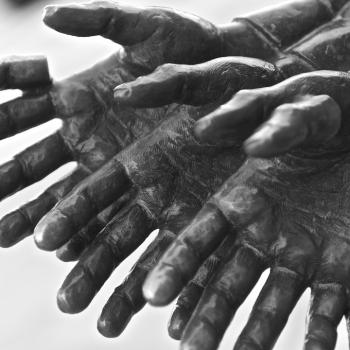When my anxieties become unmanageable – whether it’s because of personal concerns or the state of the world – I always find relief in the words of Jesus. His extended discourse in Matthew contains guidance on topics ranging from setting priorities to prayer to, yes, living with the anxiety of an uncertain life. Here’s what he has to say:
“So do not worry about tomorrow, for tomorrow will bring worries of its own. Today’s trouble is enough for today.” – Matthew 6:34
It’s good advice on its face, and comes as a capstone to his broader point about God’s promise to provide for His children’s needs. Its simplicity comes from its self-evident truth. I have enough to worry about on any given day, so why complicate matters by piling more problems on my plate, most of which I have no control over anyway? For someone like me who struggles to live in the moment, it feels like Jesus is giving me permission not to fixate on the future.
This doesn’t mean not caring about where my life (or the society I inhabit) is heading. Rather, it means accepting that the future is only knowable up to a point. All that is within my power is how I carry myself in the present. As for that scary, unknowable tomorrow, I have to trust that if I “…strive first for the Kingdom of God”, then “all these things will be given.” (Matthew 6:33)
Yet there is a disturbing tendency among some Christians to use Jesus’ assurances as a way of wrangling out of our duty to care for the problems of the world. Climate change? A worldly concern, unimportant. Poverty and despair on a mass scale? Jesus tells us not to worry, so put it out of your mind – or so the argument goes.
Not Heaven’s Waiting Room
I don’t think this is what Jesus meant. Let’s look at the earliest Greek text of Matthew to see if we can find anything helpful to interpretation. What most English Bibles translate as ‘worry’ is the Greek word μεριμνήσητε (merimnēsēte), meaning “to be anxious.” Jesus isn’t saying don’t think about tomorrow, or don’t consider what consequences today’s actions will bring tomorrow.
As I’ve written about before, Christians have responsibilities here on Earth. Our faith should not lead us to see this life as merely being Heaven’s waiting room. And that’s not an attitude we find in Jesus elsewhere in the Gospels. His teachings are very concerned with what we do here. Jesus tells us to love our enemies, apply the ‘Golden Rule’, and even make peace with our accusers on the way to the courthouse! Jesus wouldn’t trouble himself to say this if our worldly lives were of such little importance – nor would he heal the sick and raise the dead.
When Jesus talks about judgment, he is again focused on how our faith informs our conduct:
Then the king will say to those at his right hand, ‘Come, you that are blessed by my Father, inherit the kingdom prepared for you from the foundation of the world; for I was hungry and you gave me food, I was thirsty and you gave me something to drink, I was a stranger and you welcomed me, I was naked and you gave me clothing, I was sick and you took care of me, I was in prison and you visited me.’
Then the righteous will answer him, ‘Lord, when was it that we saw you hungry and gave you food, or thirsty and gave you something to drink? And when was it that we saw you a stranger and welcomed you, or naked and gave you clothing? And when was it that we saw you sick or in prison and visited you?’ And the king will answer them, ‘Truly I tell you, just as you did it to one of the least of these who are members of my family, you did it to me.’ – Matthew 25:34-46
The Bible gives us plenty of examples of anxiety and fear endured through reliance on God’s faithful presence. We are invited to cast our anxieties onto God (1 Peter 5:7) and to encourage those who have anxious hearts (Isaiah 35:4). Throughout Scripture, people of faith count on God to see them through difficulty and calamity – but not to sidestep them completely. We are freed from worry, but not from responsibility.

















